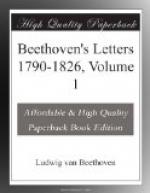[K.]
[Footnote 1: Late in the autumn of 1813.]
[Footnote 2: The concerts here referred to were given in the University Hall on the 8th and 12th December, 1813, when the Battle of Vittoria and the A major Symphony were performed for the first time. Beethoven himself conducted.]
113.
TO FREIHERR JOSEF VON SCHWEIGER.
Late in the Autumn of 1813.
MY DEAR FRIEND,—
I have to-day applied (by letter) to my gracious master to interest himself in procuring the University Hall for two concerts which I think of giving, and in fact must give, for all remains as it was. Always considering you, both in good and evil fortune, my best friend, I suggested to the Duke that you should apply in his name for this favor to the present Rector of the University. Whatever may be the result, let me know H.R.H.’s decision as soon as possible, that I may make further efforts to extricate myself from a position so detrimental to me and to my art. I am coming this evening to the Archduke.
Your friend,
BEETHOVEN.
[K.]
114.
TO HERR VON BAUMEISTER.[1]
DEAR SIR,—
I request you will send me the parts of the Symphony in A, and likewise my score. His I.H. can have the MS. again, but I require it at present for the music in the Augarten to-morrow. I have just received two tickets, which I send to you, and beg you will make use of them.
I am, with esteem, yours,
L. V. BEETHOVEN.
[Footnote 1: Private Secretary to the Archduke Rudolph.]
115.
TO ZMESKALL.
Oct. 9, 1813.
MY DEAR GOOD Z.,—
Don’t be indignant with me for asking you to address the enclosed letter properly; the person for whom it is intended is constantly complaining that he gets no letters from me. Yesterday I took one myself to the post-office, when I was asked where the letter was meant to go. I see, therefore, that my writing seems to be as little understood as myself. Thence my request to you. Your
BEETHOVEN.
116.
LETTER OF THANKS.
I esteem it my duty to express my gratitude for the great zeal shown by all those artists who so kindly cooeperated on the 8th and 12th December [1813] in the concerts given for the benefit of the Austrian and Bavarian soldiers wounded at the battle of Hanau. It was a rare combination of eminent artists, where all were inspired by the wish to be of use to their father-land, and to contribute by the exercise of their talents to the fulfilment of the undertaking, while, regardless of all precedence, they gladly accepted subordinate places.[1] While an artist like Herr Schuppanzigh was at the head of the first violins, and by his fiery and expressive mode of conducting kindled the zeal of the whole orchestra, Herr Kapellmeister Salieri




